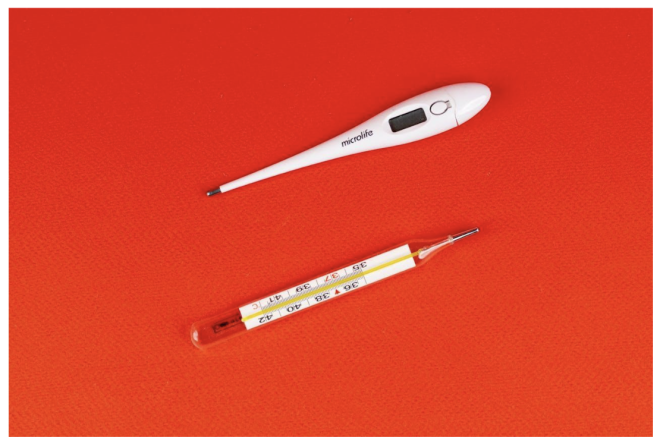- Change theme
How Long Do Medical Thermometers Last? Signs You Need a New One

A medical thermometer is a must-have in every home, helping you monitor fevers and detect illness early.
02:44 09 April 2025
A medical thermometer is a must-have in every home, helping you monitor fevers and detect illness early. But like any tool, it doesn’t last forever. Over time, a thermometer can become inaccurate, slow, or even stop working altogether. So, how long do medical thermometers really last, and when should you replace yours?
How Long Do Medical Thermometers Last?
The lifespan of a medical thermometer depends on its type, how often it’s used, and how well it’s maintained.
Digital Thermometers
These use electronic sensors to measure temperature, and over time, these sensors can become less responsive or accurate. But most digital medical thermometers last between 3 to 5 years with proper care.
Common issues: Sensor degradation, screen malfunctions, battery failure.
Infrared (No-Touch) Thermometers
Infrared thermometers, including forehead and ear models, typically last 5+ years if stored and used correctly. Since they don’t make direct contact with the skin, they tend to be more durable than oral or rectal thermometers.
Common issues: Sensor misalignment, calibration errors, low battery power.
Mercury Thermometers
Traditional mercury thermometers have an indefinite lifespan—as long as they don’t break. Since they don’t use electronic components, they don’t suffer from battery or sensor issues. However, many countries have phased them out due to the health risks associated with mercury exposure.
Common issues: Breakage, mercury leaks.
Max Min Thermometers
A max min thermometer is designed to record the highest and lowest temperatures over a set period. While more commonly used in weather tracking, some versions are used in medical settings for monitoring environmental conditions. These typically last 5+ years, but require occasional recalibration.
Common issues: Calibration drift, sensor failure.
Signs Your Medical Thermometer Needs Replacing
Even the best thermometer won’t last forever. Here are six clear signs it’s time for a replacement:
- Inconsistent Readings
If your medical thermometer gives you different temperatures for the same person within minutes, it’s a red flag. A working thermometer should provide stable and repeatable results.
- Slow Response Time
Modern thermometers typically give results within 5-10 seconds. If yours is taking longer than usual, the internal sensor may be wearing out.
- Fading or Dead Display
For digital models, a dim or unresponsive screen can indicate battery issues. If a battery change doesn’t fix the problem, the device itself may be failing.
- Physical Damage
Cracks: A cracked thermometer can allow moisture or bacteria to enter, affecting accuracy.
Leaking Mercury: If a mercury thermometer breaks, stop using it immediately and follow proper disposal methods.
- Battery Replacement Doesn’t Fix Issues
Most digital thermometers run on button-cell batteries. If you replace the battery and still experience issues, it’s a sign of an internal failure.
- Outdated Model
If your thermometer is over 5 years old, it may be worth upgrading to a newer, more advanced version. Infrared and digital models have improved significantly in recent years, offering faster readings and higher accuracy.
How to Maintain Your Medical Thermometer for Longevity
- To get the most out of your medical thermometer, follow these care tips:
- Clean It Regularly - use rubbing alcohol (70%) or disinfectant wipes after each use.
- Avoid soaking digital or infrared thermometers in water.
- Store It Properly - keep it in a dry, cool place. Avoid exposing it to extreme temperatures, as this can affect accuracy.
- Handle It with Care - don’t drop or shake it and store it in a protective case if available.
- Calibrate If Necessary - some max min thermometers and digital models allow for recalibration. Check the manufacturer’s instructions to see if this option is available.
When Should You Upgrade to a New Medical Thermometer?
If you’re experiencing any of the signs listed above, it’s time for a replacement. But even if your thermometer seems fine, upgrading to a newer model could be a smart choice.
Newer medical thermometers come with a range of benefits that make them worth the upgrade. Many models now offer faster readings, delivering results in just 1–2 seconds. You'll also notice improved accuracy, thanks to advanced sensors that provide more precise temperature measurements. For families or multi-user households, more hygienic options—like no-touch infrared thermometers—help reduce the risk of cross-contamination. Plus, some models include smart features that sync with apps, making it easier to monitor and track temperature changes over time.
Final Thoughts
A medical thermometer is an essential tool for monitoring health, but it won’t last forever. Digital models typically last 3-5 years, while infrared thermometers can last longer with proper care. Mercury thermometers, though durable, come with safety concerns.
If you notice inconsistent readings, slow response times, or a malfunctioning display, it’s time to replace your thermometer. Taking proper care of your device—by cleaning, storing, and handling it correctly—can help extend its lifespan.
When in doubt, investing in a newer, more advanced thermometer can give you peace of mind and ensure you’re getting accurate temperature readings when it matters most.
